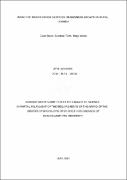Impact of microfinance services on business growth in rural Uganda
Abstract
The study examined the impact of microfinance services on business Growth in rural Uganda.
The Specific objectives included to: find out the effect of loan services on growth of rural
businesses, examine the contribution of skills development/training on growth of rural
businesses, find out the contributions of financial advice services on growth on business
growth and find out the influence of savings on growth of rural businesses. The study adopted
a cross-sectional research design using both qualitative and quantitative research paradigms
and targeted the business owners in Buwama Town, sampling a total of 80 (eighty)
respondents. The study used questionnaires to collect data which was analyzed and presented
in tabular tables inform of percentage and frequencies means and standard deviation. The
study revealed that: accessing a loan from a microfinance institution is beneficial to their
business and that loans are used for agricultural production, trading, processing and transport.
Loan services can help them develop innovative methodologies for reaching different market
niches. Additionally, the MFIs integrates adequate & timely credit into larger developmental
processes such as community and leadership training, entrepreneurship and that the real
business owners get deeper issues of how money is utilized and invested by low-income
individuals. Business owners are now able to make financial decisions with the help from
professional financial advisors and those financial advisors help individual investors make
informed investment choices and avoid some investment mistakes. It was also revealed that
businesses can make a pool of savings in order to have a source of lending funds thus
facilitate & finance their businesses and that the business owners are able to access ready and
available capital. It was also shown that savings groups offer a safe place to keep money and
are a way to provide access to small loans for boosting businesses. Finally, recommendations
made include: the government needs to supplement efforts of microfinance institutions and
allow more microfinance institutions to operate in all areas of the country especially the rural
areas so as to meet the increasing demand of their services in such areas. It is also
recommended that management needs to revisit and reconsider their policies and provide
grace periods for these business owners before they begin with the repayment process. This
will allow them get enough time to gather money for the repayments


